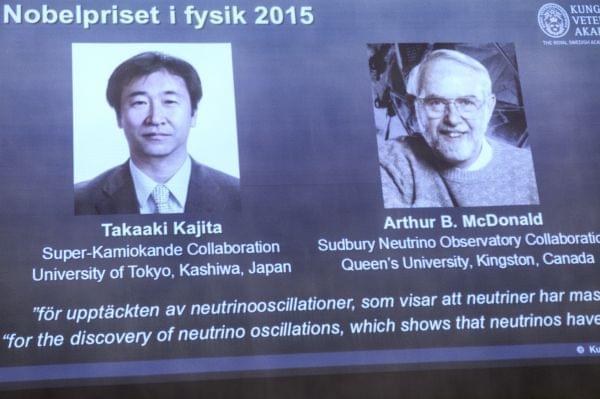U Of I Prof’s Research Led To Nobel Prize In Physics

A screen shows the winners as members of the Nobel Assembly announce the winner of the 2015 Nobel Prize in physics, in Stockholm Tuesday. The Royal Swedish Academy of Sciences said the two researchers had made key contributions to experiments showing that neutrinos change identities. Fredrik Sandberg/TT via AP
There's an Illinois connection to the research that led to Tuesday's awarding of the Nobel Prize in Physics. Two scientists from Canada and Japan, Arthur McDonald and Takaaki Kajita, were honored for helping to solve a key puzzle about the sub-atomic particles known as neutrinos.
Their work showed that the particles transform in space. That led to the ground-breaking discovery that neutrinos also have mass, a discovery that built on the earlier work of Mark Neubauer, now a physics professor on the University of Illinois' Urbana campus.
"This result really showed that there's really interesting physics, in the neutrinos themselves – they're massive and they mix," he said. "And it's kind of a very active area of research right now, at Fermilab and other places, in trying to create beams of neutrinos to study them with a lot of precision and understand their properties."
As a graduate student in Pennsylvania, Neubauer took part in a 2001 experiment that helped pave the way for the Nobel-winning discovery.
He says this recent finding will require a new understanding of particle physics.
Links
- 3 Scientists Win Nobel In Physics For Development Of Blue LED
- LED Inventor Holonyak Retires From U of I
- Engineering Professor Holonyak Honored on LED’s 50th Anniversary
- Laser: The Inventor, the Nobel Laureate, and the Thirty-Year Patent War
- U of I Inventor, Bypassed For Nobel, To Share Draper Prize
- LED Inventor, U of I Professor, Feels Work Bypassed By Nobel
- Nobel Goes To Scientists Who Took Chemistry Into Cyberspace
- Professor Mark Neubauer profile at U of I
